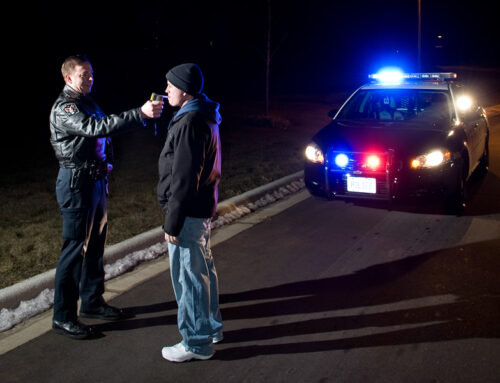In today’s surprising 5-2 decision, the Minnesota Supreme Court ruled that it’s constitutional to criminalize test refusal in a DWI case where the driver refuses to submit to a breath test. The case is State v. Bernard. You can read the court’s decision here.
For the first time in history, the court applied the “search-incident-to-arrest” exception to DWI cases, and ruled that the Fourth Amendment does not require a warrant to search a person’s breath for alcohol content after a valid DWI arrest. Because a warrant is not required to search the person’s breath for alcohol content, a driver’s refusal to submit to breath testing does not implicate a fundamental right, i.e., the right to be free of a warrantless search. Therefore, the State of Minnesota can criminalize a driver’s refusal to submit to breath testing. The court further ruled that Minnesota’s test refusal law is a reasonable means to a permissive object, and therefore, it does not violate defendant’s right to due process of law.
Importantly, the court’s decision in Bernard is limited to cases in which a driver refuses a breath test. In Minnesota, the police can request a driver to submit to a blood or urine test in lieu of a breath test. The search-incident-to-arrest exception will not necessarily apply to drivers who refuse a blood or urine test because those tests are arguably more invasive. With today’s decision, further litigation will ensue in cases where a driver refuses a blood or urine test.
The decision is noteworthy for its unprecedented expansion of the search-incident-to-arrest exception to the Fourth Amendment. Effectively, the court significantly abrogates the recent United States Supreme Court decision in Missouri v. McNeely, which ruled that the exigency arising from the natural dissipation of alcohol did not justify a warrantless search for blood alcohol content in a routine DWI case. Stated otherwise, McNeely ruled that the police needed to obtain a warrant to search the driver for blood alcohol content because exigency was not a valid exception to the warrant requirement when the driver submitted to a blood test. The Minnesota Supreme Court distinguishes Bernard from McNeely by rationalizing that a breath test is less intrusive than a blood test. Further, the Minnesota court argues that the U.S. Supreme Court never considered the search-incident-to-arrest exception in McNeely.
With the Minnesota Supreme Court’s decision today in Bernard, a warrant never is required to search a driver’s breath for alcohol content if the driver’s arrest for DWI is valid, i.e., supported by probable cause. According to the logic of the Minnesota Supreme Court, McNeely was decided on the wrong grounds (although McNeely involved a blood test). The government’s justification for a warrantless search for alcohol content isn’t exigency; it’s “search incident to arrest.” Until McNeely, the Minnesota Supreme Court relied on an overly-expansive interpretation of the exigency exception to uphold Minnesota’s DWI laws. After McNeely, the court no longer could rely on the exigency exception, which cast significant doubt on the constitutionality of Minnesota’s DWI laws. In today’s Bernard decision, the court conveniently upheld Minnesota’s DWI laws by applying a new exception to the Fourth Amendment – “search incident to arrest.”
Further, today’s Bernard decision is noteworthy for the sharp dissenting opinion of Justices Alan Page and David Stras of the Minnesota Supreme Court. These justices argue that the court’s decision is erroneous because it “fundamentally departs from longstanding Fourth Amendment principles, and nullifies the warrant requirement in nearly every drunk-driving case…. In the end, the court ultimately arrives at a decision that is as notable for its disregard of Supreme Court precedent as it is for its defective logic.”
Due to its apparent abrogation of McNeely, Bernard may reach the Supreme Court of the United States (SCOTUS), assuming Bernard and his lawyers seek review by SCOTUS.
The ACLU of Minnesota voiced its displeasure with today’s Bernard decision as follows:
“The Minnesota Supreme Court has set a dangerous precedent by first, allowing police to do intrusive warrantless searches of biological material taken from inside a person’s body merely because they had enough evidence to arrest them; and second, allowing people to be charged with a crime for refusing to submit to a warrantless search. Imagine if the police could charge us with a crime if we refused to allow them into our houses without a warrant, people would be outraged.”





Leave A Comment